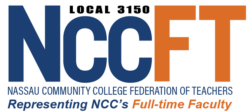Because the Board did not have a quorum—only four trustees were present—the Board could not conduct official business. They did, however, hear public comments. Here’s a summary:
Professor Evelyn DeLuty, Academic Senate Chair, asked why we had to learn about the swastikas which were discovered on campus from external sources. She pointed out that the federal Clery Act mandates that colleges make crimes public when they occur. (The NCCFT’s statement on this can be found here.)
Professor Sally Drucker of the English Department, who teaches Literature of the Holocaust, pointed out that, as of the time of the Board meeting, students had not yet been directly informed about the swastikas. She pointed out that the murders of the Holocaust were the last step in a long process and urged us not to overlook what is happening on our campus and in our country, which could indicate that we are at the beginning of such a process. To encourage students to be “up standers” not bystanders, she suggested that an award be given annually to a student who takes action on behalf of others.
Professor Paul Rosa, who teaches in the English Department and is a member of the Academic Senate Executive Committee, spoke about the importance of including the liberal arts in vocational education.
Professor David Stern, from the Physical Sciences Department and also a member of the Academic Senate Executive Committee, spoke about three policy documents under consideration by the Board: 3100 Media Relations, 3200 Marketing, Advertising and Promotional Materials, and 5600 Protection of Minors on Campus. He pointed out that the faculty had not been given an opportunity to see or comment on the policies. (Note: The policies were approved by a Board committee earlier in the evening and were slated for discussion, but because they didn’t have a quorum, there was no discussion.)
Following Professor Stern’s comments, Kathy Weiss pointed out that the new BOT policies 1200/1300 adopted in November provided for a process in which the BOT discusses a policy at one meeting but does not vote until the next meeting. Therefore, these three proposed policies will be discussed in January but voted upon in February, giving everyone ample opportunity to weigh in. The documents have been posted to the NCC website. The links are above.
Finally, a member of the public—an NCC grad from 1968!—objected to not being on the speakers list. Kathy Weiss said she will help him get on the list for future meetings. The next one is January 10.
—with many, many thanks to Phyllis Kurland for providing the notes for this summary
